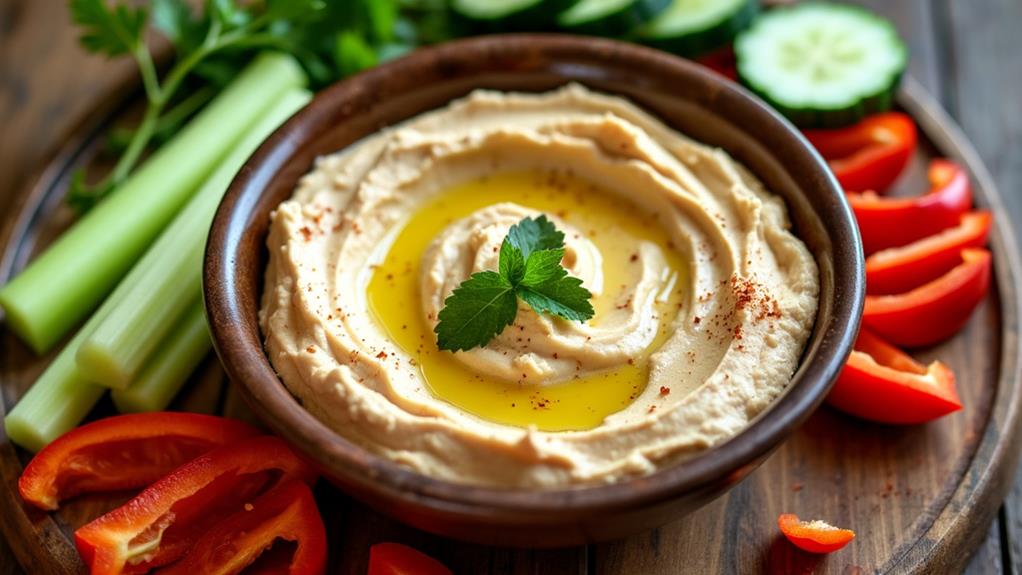
Maintaining a low-carb diet on keto doesn't mean you have to miss out on the nutritional benefits of beans. Options such as green beans, black soybeans, and mung bean sprouts offer low carbohydrate counts while providing essential nutrients. Tofu and tempeh add protein and versatility to your meals, while lupin beans and edamame are excellent sources of fiber and vitamins. Incorporating these beans and legumes can help sustain a keto lifestyle without compromising on health benefits. To explore how these options can be effectively incorporated into your meals, more specific insights are available.
Key Takeaways
- Green beans contain only 2.4 grams of net carbs per 1/2-cup serving, making them a low-carb option.
- Black soybeans offer 4.5 grams of net carbs per 1/2-cup, high in protein and fiber.
- Firm tofu provides 1.4 grams of net carbs per 100 grams, rich in protein and minerals.
- Mung bean sprouts have approximately 2 grams of net carbs per 100 grams, along with vitamins and antioxidants.
- Tempeh contains just 1 gram of net carbs per 3-ounce serving, with high protein and a nutty flavor.
Green Beans
Green beans, a staple in many keto-friendly diets, boast an impressive nutritional profile that supports low-carb eating plans. Containing only 4.3 grams of total carbohydrates and 2.4 grams of net carbs per 1/2-cup serving, green beans are among the lowest carb options available. Their versatility in preparation methods—such as steaming, sautéing, or roasting—makes them a perfect fit for a variety of green bean recipes that can easily be incorporated into ketogenic diets. Additionally, green beans can help in regulating appetite due to their fiber content, which promotes feelings of fullness.
In addition to their low carbohydrate content, green beans offer a modest amount of protein at 2.2 grams per serving, while being exceptionally low in fat, with just 0.1 grams. This nutrient composition aligns well with the macronutrient goals of a ketogenic diet.
At approximately 20 calories per 1/2-cup serving, green beans also aid in managing caloric intake, making them an excellent choice for those aiming to maintain or reduce body weight.
Green bean varieties, such as French green beans (haricots verts) and string beans, are rich in vitamins A, C, and K, along with essential minerals. These nutrients contribute to overall health, making green beans a nutritionally valuable component of a balanced, low-carb lifestyle.
Black Soybeans
Boasting remarkable versatility and nutritional benefits, black soybeans emerge as a superior option for those adhering to a ketogenic lifestyle. With only 4.5 grams of net carbs per 1/2 cup serving, black soybeans are one of the most keto-friendly bean options available. Their low carbohydrate content makes them ideal for maintaining ketosis while still enjoying the texture and flavor of traditional beans.
Compared to other legumes, black soybeans also contribute to enhanced insulin sensitivity, supporting better blood sugar management. Nutritional comparisons show that black soybeans are not only low in carbs but also high in protein, offering about 18.2 grams per 1/2 cup. This high protein content supports muscle maintenance and enhances satiety, vital aspects of a low-carb diet. Additionally, black soybeans are rich in fiber, which aids in digestive health and overall well-being.
Incorporating black soybeans into your diet is relatively simple, thanks to their adaptability in various black soybean recipes. They can be used as a substitute for traditional beans in dishes such as chili, refried beans, and salads, providing a similar texture with considerably fewer carbs.
However, it is essential to monitor portion sizes to guarantee that carbohydrate intake remains within daily limits, thereby supporting the goals of a ketogenic diet.
Firm Tofu
Following the discussion on the benefits and versatility of black soybeans, another excellent keto-friendly option to contemplate is firm tofu.
Firm tofu, with only 2.8 grams of total carbohydrates and 1.4 grams of net carbs per 100-gram serving, stands out as an exceptional low-carb choice for those adhering to a ketogenic diet. Its high protein content, offering 17.3 grams per serving, makes it a robust protein alternative, essential for meeting daily protein requirements while maintaining low carbohydrate intake.
As a soy product, firm tofu is not only an excellent source of plant-based protein but also contains essential amino acids, enhancing its nutritional value. This makes it an ideal option for vegetarians and vegans seeking to incorporate high-quality protein into their diet. Additionally, firm tofu is rich in calcium, which supports bone health, and magnesium, which aids various bodily functions. To preserve its keto-friendly nature, it is advisable to select unflavored varieties, thereby avoiding added sugars and unnecessary carbohydrates.
Firm tofu's versatility is unrivaled, as it can be incorporated into a variety of tofu recipes such as stir-fries and salads.
This adaptability guarantees a dynamic and enjoyable meal plan while keeping carbohydrate counts low, making firm tofu a staple in any keto-focused diet.
Mung Bean Sprouts
Mung Bean Sprouts
Mung bean sprouts represent a highly suitable option for those adhering to a ketogenic diet due to their low carbohydrate content, containing approximately 2 grams of net carbs per 100 grams. These sprouts are not only low in carbs but also rich in essential nutrients.
Mung bean nutrition highlights the presence of vitamins A, C, and K, which are important for maintaining overall health and strengthening the immune system. Additionally, mung bean sprouts are a valuable source of antioxidants, which help combat oxidative stress and inflammation. They also provide a good amount of essential amino acids, which are necessary for muscle maintenance and recovery.
From a protein perspective, mung bean sprouts deliver approximately 3 grams of protein per 100 grams, making them an excellent plant-based protein option for keto dieters. Their low-calorie profile, with only about 30 calories per 100 grams, further supports weight management goals.
Sprout cultivation of mung beans is a straightforward process, allowing for fresh and nutrient-dense additions to a variety of meals. Their versatility in cooking is notable; they can be seamlessly incorporated into salads, stir-fries, and used as crunchy toppings, enhancing the texture and flavor of dishes without compromising carbohydrate limits.
Edamame
Edamame, or young soybeans, offer an impressive nutritional profile with approximately 8.9 grams of total carbohydrates and 6.7 grams of net carbs per 1/2-cup serving, making them a suitable choice for low-carb diets.
Rich in high-quality protein and essential amino acids, edamame supports muscle maintenance and overall health.
These versatile legumes can be steamed, enjoyed as a snack, or added to various dishes, providing not only nutritional benefits but also enhancing dietary fiber intake for improved digestion.
Edamame is also a great source of B vitamins, which are vital for maintaining muscle mass and cardiovascular health.
Nutritional Profile Overview
When evaluating the nutritional profile of edamame, it becomes evident why this legume is often recommended for a keto-friendly diet. Edamame benefits include being an excellent protein source, with 8.5 grams of protein per 1/2 cup serving. This high-quality protein content makes it a valuable addition to any low-carb diet, catering to those seeking plant-based protein options.
Apart from its impressive protein profile, edamame offers a balanced macronutrient composition. It provides 8.9 grams of total carbs per 1/2 cup serving, out of which 6.7 grams are net carbs, fitting well within the ketogenic guidelines. The fiber content is notable, with 4 grams per serving, contributing to improved digestive health and enhanced feelings of satiety.
Edamame is also a rich source of essential vitamins and minerals. It contains significant amounts of vitamin K and folate, which are vital for bone health and cellular function, respectively.
Additionally, with only 0.5 grams of fat per serving, it remains a low-fat option, aligning well with the fat-focused nature of keto diets.
Incorporating edamame into your meals can enhance both flavor and texture, making it a versatile and nutritious component of a keto-friendly regimen.
Preparation and Serving Ideas
Incorporating edamame into a ketogenic diet can be both simple and versatile, offering numerous preparation and serving options that align with low-carb guidelines. Given its favorable edamame nutrition profile, with 6.7 grams of net carbs per 1/2 cup, edamame is an excellent addition to keto-friendly meals.
Edamame Recipes to Try:
- Steamed Edamame with Sea Salt: This classic preparation method is both quick and nutritious. Simply steam the young soybeans and sprinkle them with sea salt for a delightful snack or appetizer.
- Edamame Salad Add-In: Enhance your salads with a protein boost by adding steamed edamame. This addition not only provides all nine essential amino acids but also brings texture and a mild, nutty flavor to your greens.
- Edamame Dip: For a unique twist, blend edamame with olive oil, garlic, lemon juice, and tahini to create a creamy dip. This edamame recipe serves as a keto-friendly alternative to traditional hummus, perfect for pairing with low-carb vegetables.
Incorporating edamame into your meals not only adds flavor and texture but also boosts fiber intake, supporting digestive health while adhering to a low-carb diet.
These evidence-based edamame recipes guarantee you enjoy the nutritional benefits without compromising on taste or diet guidelines.
Health Benefits Highlights
Beyond the culinary versatility of edamame, its nutritional profile offers significant health benefits that complement a ketogenic diet. One of the key edamame benefits is its low carbohydrate content, with only 6.7 grams of net carbs per 1/2 cup serving. This makes it a suitable choice for those adhering to a low-carb lifestyle.
Additionally, edamame provides approximately 8.5 grams of protein per serving, making it an excellent plant-based protein source. This is particularly advantageous for individuals on a ketogenic diet who may seek to diversify their protein intake beyond animal sources.
Another notable nutritional advantage of edamame is its high fiber content, approximately 4 grams per 1/2 cup. Fiber is essential for aiding digestion and promoting a feeling of fullness, which can help in managing overall caloric intake.
Furthermore, edamame is classified as a complete protein, containing all nine essential amino acids necessary for ideal nutrition. This aspect further underscores its value in a balanced diet.
In addition to macronutrients, edamame is rich in essential vitamins and minerals, including vitamin K, folate, iron, and magnesium. These micronutrients contribute to various aspects of health, such as bone health, red blood cell formation, and muscle function, enhancing overall wellness.
Lima Beans
Lima Beans
Lima beans, though occasionally appealing for their creamy texture and nutrient density, present a challenge for those adhering to a strict ketogenic diet due to their substantial carbohydrate content.
With approximately 12 grams of net carbs per 1/2 cup serving, lima beans can quickly exceed the low daily carb limits set by keto guidelines. However, their nutritional profile is nonetheless impressive, offering a good source of dietary fiber, protein, iron, and potassium.
It's important to note that starchy vegetables like lima beans can disrupt ketosis if consumed in large quantities.
Key Points:
- Carbohydrate Content: Lima beans contain around 12 grams of net carbs per 1/2 cup, making them less suitable for strict keto.
- Nutrient Density: They are rich in nutrients such as fiber, protein, iron, and potassium, contributing to overall health benefits.
- Usage in Recipes: The creamy texture of lima beans makes them a popular ingredient in soups, stews, and side dishes. Careful portion control is necessary.
For those following a flexible or modified keto approach, incorporating lima beans in small amounts during carb-up days or pairing them with high-protein meals can provide a balanced nutritional intake.
Despite their higher carb content, understanding lima bean nutrition and carefully selecting lima bean recipes can help integrate them into a low-carb lifestyle effectively.
Lupin Beans

Lupin beans stand out as a low-carb legume option that seamlessly fits into a ketogenic diet. With approximately 5 grams of net carbs per 1/2-cup serving, they align well with the stringent carbohydrate restrictions characteristic of keto plans.
What sets lupin beans apart is their high protein content, offering around 26 grams per 100 grams, which is significant in meeting the increased protein requirements often associated with low-carb diets. Additionally, lupin beans help improve insulin sensitivity, which is vital for effective blood sugar management in type 2 diabetes.
The lupin bean nutrition profile extends beyond macronutrients, boasting about 8 grams of fiber per 100 grams. This high fiber content not only promotes digestive health but also helps in maintaining satiety, an essential aspect of dietary adherence.
Rich in essential vitamins and minerals such as potassium, magnesium, and folate, lupin beans contribute to overall nutrient intake, which can sometimes be a concern on restrictive diets.
Incorporating lupin beans into daily meals is straightforward, thanks to their versatility. Lupin bean recipes can range from hearty soups and invigorating salads to innovative meat substitutes in various dishes.
Their adaptability makes them an excellent addition to a keto-friendly menu, ensuring nutritional adequacy without compromising on taste or variety.
Tempeh
Tempeh, a fermented soybean product, stands out as a keto-friendly option with only 1 gram of net carbs per 3-ounce serving, making it an excellent low-carb protein source.
With its high protein content of approximately 17.3 grams per serving, tempeh supports muscle maintenance and enhances satiety, essential for those on a ketogenic diet.
Its firm texture and nutty flavor offer versatile cooking options, suitable for dishes like stir-fries and salads.
Additionally, tempeh is rich in nutrients, providing a good source of iron and calcium, which are important for vegetarians.
Although it is advisable to select unflavored varieties to avoid added sugars.
Low-Carb Protein Source
When seeking a low-carb protein source that aligns with a ketogenic diet, one excellent option is a fermented soy product known as tempeh. With only 1 gram of net carbs per 3-ounce serving, tempeh stands out as an ideal choice for keto enthusiasts. Its impressive protein content of approximately 17.3 grams per serving makes it a nutritious alternative to traditional protein sources.
Tempeh benefits extend beyond its macronutrient profile. It is rich in dietary fiber, which not only aids digestion but also helps maintain satiety, an essential factor when adhering to a low-carb diet. Additionally, tempeh's fermentation process enhances its digestibility and nutrient absorption, contributing to overall gut health.
Consider the following key points about tempeh:
- Low-Carb Content: Only 1 gram of net carbs per serving.
- High Protein: Provides approximately 17.3 grams of protein per serving.
- Rich in Fiber: Supports digestion and satiety.
Incorporating tempeh into your diet can be deliciously simple with numerous tempeh recipes available, from savory stir-fries to invigorating salads.
To maximize its keto-friendly benefits, opt for unflavored varieties to avoid added sugars that can increase carbohydrate content.
Versatile Cooking Options
Exploring tempeh's culinary potential reveals a wealth of versatile cooking options suitable for a ketogenic diet. Tempeh, made from fermented soybeans, boasts an impressive nutritional profile with only 1 gram of net carbs per 3-ounce serving and approximately 17 grams of protein. This makes it an excellent meat substitute for those adhering to low-carb dietary guidelines.
One of the most effective ways to incorporate tempeh into a keto-friendly meal plan is through tempeh marinades. Marinating tempeh not only enhances its natural nutty flavor but also infuses it with additional layers of taste. Popular marinades might include combinations of soy sauce, ginger, and garlic, which are all low in carbohydrates and high in flavor.
Tempeh stir fries also offer a quick and nutritious option. The firm texture of tempeh holds up well against high-heat cooking, allowing it to absorb flavors from other low-carb vegetables and healthy fats like avocado oil or coconut oil.
This method guarantees a satisfying and nutrient-dense meal that supports gut health through the probiotics gained from fermentation.
Hummus

Traditional hummus, a staple in many diets, is typically made from chickpeas, which contain about 17 grams of net carbs per 1/2 cup, rendering it unsuitable for strict ketogenic plans.
However, for those committed to a low-carb lifestyle, several keto hummus recipes utilize chickpea alternatives to create a delicious, carb-conscious dip. These alternatives, such as cauliflower or avocado, considerably reduce the carb content while maintaining a rich, creamy texture.
It's important to maintain a balance of macronutrients to guarantee the keto diet's effectiveness and sustainability.
Here are three keto-friendly options:
- Cauliflower Hummus: Steamed and blended cauliflower can serve as an excellent chickpea substitute. It provides a similar texture with only about 2-3 grams of net carbs per serving.
- Avocado Hummus: Combining ripe avocados with traditional hummus ingredients like garlic, lemon juice, and tahini results in a flavorful dip with just 2 grams of net carbs per 1/4 cup.
- Zucchini Hummus: Raw or lightly steamed zucchini can also be blended into a smooth paste, offering a low-carb alternative with a revitalizing taste.
When preparing or purchasing keto-friendly hummus, always check for added sugars, which can inadvertently increase the overall carb content, compromising your ketogenic efforts.
Bean Substitutes
Finding suitable bean substitutes is essential for individuals adhering to a ketogenic diet, as traditional beans are high in carbohydrates. To maintain the low-carb requirements, several alternatives can effectively replace beans in various dishes.
Mushroom varieties, for instance, serve as a low-carb substitute in soups and chili, offering a similar texture with only about 3 grams of net carbs per cup. This makes them an excellent choice for those aiming to preserve the mouthfeel of beans without the carb overload. Additionally, mushrooms are rich in antioxidants and can help reduce inflammation, similar to olive oil.
Eggplant dishes also provide an effective replacement, particularly in dips, delivering a creamy consistency with approximately 6 grams of net carbs per cup.
For those who enjoy bean dips, avocado recipes offer a keto-friendly alternative with only 2 grams of net carbs per 100 grams, while also contributing healthy fats essential for the ketogenic diet.
Ground meat options, such as beef or turkey, can add protein and substance to bean-centric dishes, ensuring satiety without the added carbohydrates.
Frequently Asked Questions
What Are the Lowest Carb Beans on Keto?
The lowest carb beans for keto include green beans with 2 grams of net carbs per serving. Black soybeans benefit keto dieters with 4.5 grams of net carbs and high protein. Green bean alternatives include mung beans and firm tofu.
Can You Eat Canned Beans on Keto?
Yes, you can incorporate canned beans into a keto diet, but it is essential to focus on canned bean nutrition. Opt for low-carb varieties and consider creative keto meal ideas to maintain your dietary goals effectively.
What Beans and Lentils Are Keto-Friendly?
When considering the benefits of legumes for keto meal ideas, green beans, black soybeans, firm tofu, mung beans, and edamame are keto-friendly options. These legumes are low in net carbs and provide substantial protein and nutrients.
Can You Eat Heinz Beans on Keto?
Heinz Beans are not advisable on a keto diet due to their high carbohydrate content. Instead, consider bean alternatives like black soybeans for their low carb count and nutritional benefits, or substitute with mushrooms or zucchini.
Conclusion
Incorporating keto-friendly beans into a low-carb diet can greatly enhance nutritional variety and support overall health goals. Green beans, black soybeans, firm tofu, mung bean sprouts, edamame, lupin beans, and tempeh offer versatile options rich in protein, fiber, and essential nutrients while maintaining low carbohydrate content. Additionally, hummus and strategic bean substitutes can further diversify meal plans. Adopting these alternatives guarantees adherence to keto guidelines without compromising dietary satisfaction and nutritional balance.










No Comments